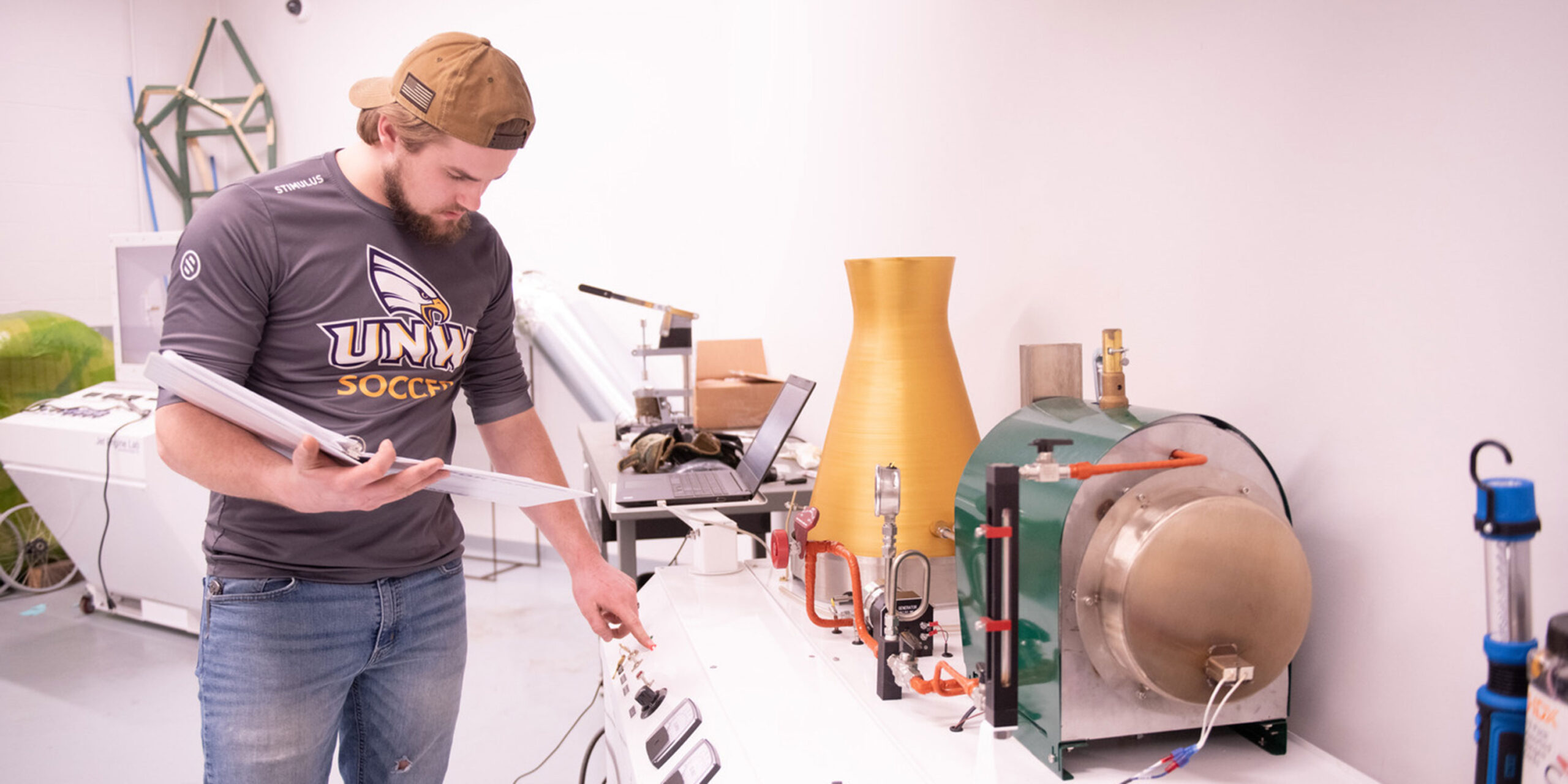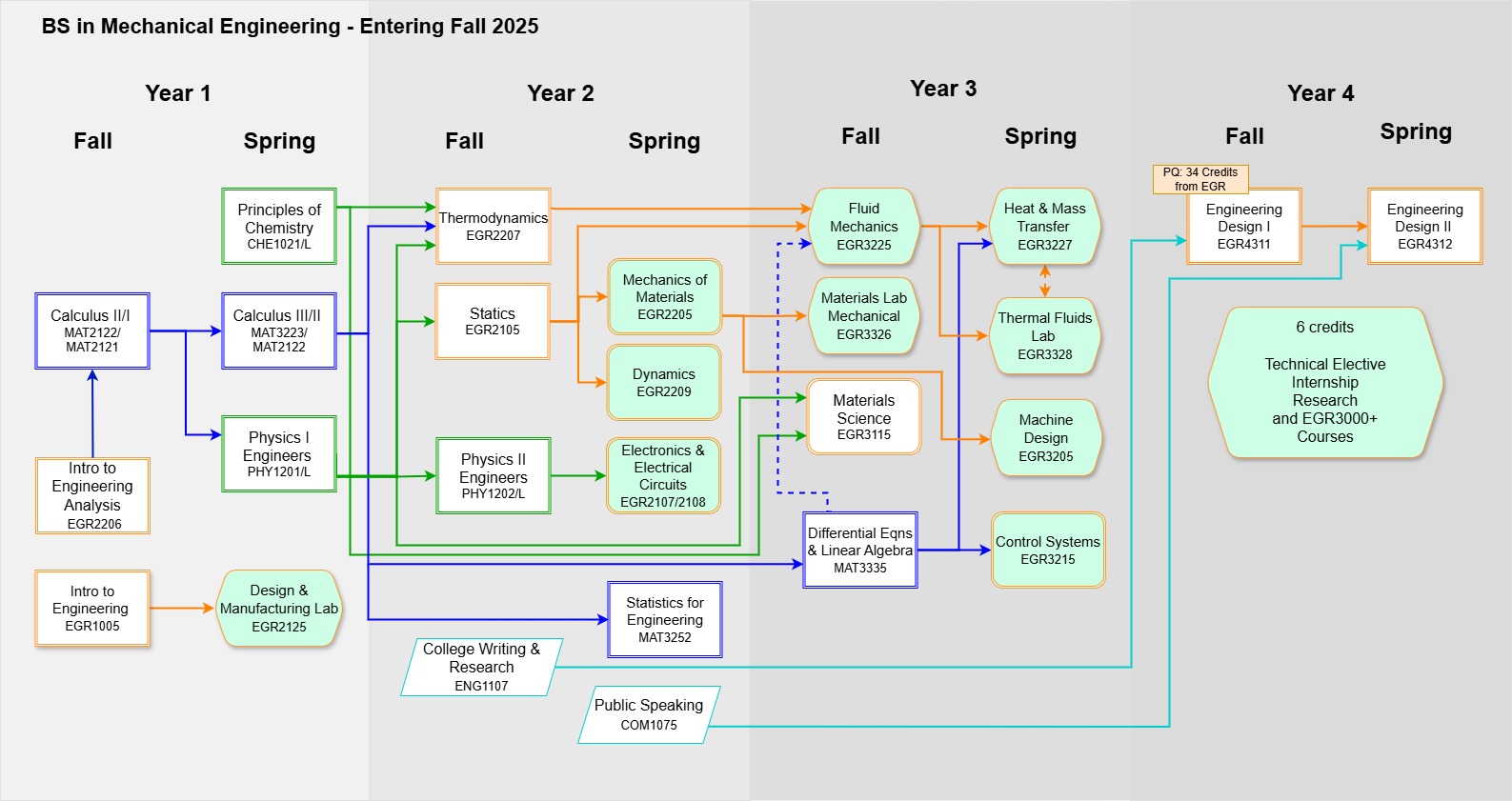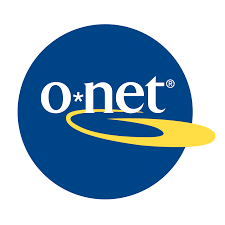The program prepares graduates to be engineering leaders who are able to coordinate a multidisciplinary team to research, design, and implement solutions with consideration of standard procedures, ethical practices, contemporary technologies, and the impact on creation for God-honoring service to the profession, community, and world.
This might be the right degree for you if you
- are curious about how the world works
- desire to understand technical problems
- seek to find creative solutions to problems
Why study Mechanical Engineering at Northwestern?
Northwestern offers a bachelor’s degree that combines a major in Mechanical Engineering and a minor in Bible. Our program perspective gives you context to comprehend the intentions of God’s plan for human activity. You will discover the environmental, economic, ethical, sustainable, and safety impact of engineering designs on creation and mankind.
Our Mechanical Engineering program prepares you for the industry by focusing on success through community. You will be encouraged to solve problems alongside your classmates. You will benefit from small class sizes that give you individual attention throughout your rigorous engineering coursework.
With campus so close to downtown Minneapolis and St. Paul, students can take advantage of opportunities in Minnesota’s thriving engineering and manufacturing industries.
Note: Most courses in the engineering program require access to a Windows-based computer with these specifications.
Request Information
Your Pathway to Mechanical Engineering.
Mechanical Engineering equips students with the skills to design, analyze, and create technologies that drive industries. This versatile program offers opportunities to solve real-world problems and contribute to advancements in sustainability and cutting-edge technology. Explore your degree pathway today!
Extend your Mechanical Engineering degree with minors to support these skills!
Entrepreneurship
Coupling engineering with a solid business foundation fuels the competencies needed for entrepreneurial and partnership ventures and project management skills in engineering.
EntrepreneurshipProject Management
Add a business minor with a class in project management to your engineering major to open up doors within your industry. Indeed.com lists higher earning potential, wider job opportunities, and greater visibility in both fields as some of the benefits of adding business as a secondary program or minor.
Business Administration MinorBiomedical Engineering
Minnesota industry prefers mechanical and electrical engineering for medical device and catheter development and manufacturing. A minor in health sciences extends your foundation in biology, physiology, biochemistry, and knowledge of health and wellness.
Health SciencesEducational Objectives
Our engineering alumni have the following professional abilities:
- Demonstrate that learning is at the heart of profession and faith through continuing education, mentorship, certification, professional membership, and related opportunities.
- Express ideas and solutions using effective communication skills in order to provide leadership for a multidisciplinary professional or research team.
- Live out the Christ-centered worldview imparted by the comprehensive, global, and multidisciplinary education in order to develop engineering solutions informed by the ethical, social, and cultural intentions of God’s plan for humanity.
Student Outcomes
Through completing the engineering degree, you will be able to:
- Identify, plan, and solve complex engineering problems by applying principles of engineering, science, and mathematics
- Apply engineering design to produce solutions that meet specified needs with consideration of public health, safety, and welfare
- Communicate with a range of audiences
- Recognize ethical and professional responsibilities in engineering and make informed judgments, while considering the impact of engineering solutions in global, economic, environmental, and societal contexts
- Work together on a team to provide leadership, create a collaborative and inclusive environment, establish goals, plan tasks, and meet objectives
- Develop and conduct appropriate experimentation, analyze and interpret data, and use engineering judgment to draw conclusions
- Apply new knowledge using appropriate learning strategies
Careers in engineering
There are a variety of career and academic pathways that begin with a degree in engineering.
What They Do
Job Title: Mechanical Engineers
Design Engineer, Mechanical Engineer, Product Engineer, Project Engineer
Perform engineering duties in planning and designing tools, engines, machines, and other mechanically functioning equipment. Oversee installation, operation, maintenance, and repair of equipment such as centralized heat, gas, water, and steam systems.
Career Outlook Description
New job opportunities are very likely in the future.
Career Outlook Indicator
Bright
Annual Salary Range
$64,560 – $157,470
Hourly Salary Range
$31.04 – $75.71
What will I learn?
Engineering students learn to coordinate a team-effort to solve complex problems.
EGR 3215
Control Systems
Introduction to control system design, including time domain analysis and frequency domain analysis of control systems. Characteristics, modeling and performance of feedback control systems are analyzed and discussed. A $200 course fee required.
EGR 4311
Engineering Design I
Systematic project design with consideration of client need and specification is implemented by a student team. In particular, the team researches and proposes a solution with analysis of components, materials, man-power, cost estimate, and possible health, safety, environmental, ethical, and social impact. An approved project is then scheduled to identify and define major activities in each project phase, minimize resource conflicts, describe team member responsibilities, and ensure cost effective budgeting, control, and reporting in order to audit, assess, and mitigate project risk. A $200 course fee required.
EGR 2107
Introduction to Electronics and Electrical Circuits
Introduction to modeling, analysis, and design of linear circuits using lumped models for various sources and passive elements. Topics include the application of Ohm’s and Kirchhoff’s laws, transient and steady state analyses of reactive circuits, and use of ideal diode, BJT, FET, and operational amplifier models in the design of practical applications. A $200 course fee required.
EGR 2206
Introduction to Engineering Analysis
An introduction to engineering mathematics, problem solving, and graphical display using analytical techniques as well as standard computational tools, such as MATLAB. Specifically, algebraic manipulation of engineering equations, functions, trigonometry, vectors, complex numbers, sinusoids and harmonic signals, logarithms and exponentials, solving systems of equations, and concepts of calculus are introduced within the context of engineering problem-based assignments and projects.
EGR 2205
Mechanics of Material
Basic classical concepts of structural analysis, including external reactions, internal forces and deformations of two- and three-dimensional statically determinate and indeterminate structures. A $200 course fee required.
EGR 2207
Thermodynamics
A study of the first and second laws of thermodynamics; basic energy concepts; the properties of liquids and vapors including enthalpy and entropy. Analysis of power and refrigeration cycles. Introduction to gas mixtures, chemical reactions and chemical and phase equilibrium. A $200 course fee required.

Still have questions about this program or how to apply?
Our team is ready with answers!
Discover the School of Science & Engineering
Professors at Northwestern are focused on their students first. Our faculty include experts in their respective fields who want to help you grow in your faith while you earn your degree.







